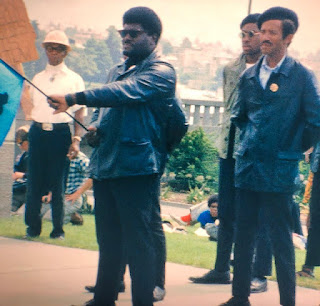Mind and Body
Varda's 28-minute documentary portrait, called simply Black Panthers [1968], is centered around the incarceration of Huey P. Newton for his alleged murder of Oakland police officer John Frey. Her film does not so much focus on Newton (who is interviewed on-camera from a cell) as it does on the "Free Huey!" gatherings that erupted in Oakland in the time surrounding his trial. Varda's portrait — shot obviously from the standpoint of a Frenchwoman and a mostly French crew — serves as an ethnographic observation of Black culture in America in general and within a specific moment of crisis. It's also a geographical account of the city itself: Bobby Hutton and Eldridge Cleaver, for example, took refuge in the basement of a house, shown, where fifty policemen fired a thousand rounds. Unassuming, clear as though it were 2021, this house, though obfuscated by its sheer normalcy.
Newton calls the Black Panthers (which he co-founded) "practical revolutionaries" that identify with anti-colonialist peoples and factions throughout the world — the Cubans, for example.
"We feel that Black people should be exempt from the army because they have nothing to fight for in Vietnam." A mix of desired rollbacks and restitutions, in the way that can only be born of a nascent revolutionary counter-movement, counter-majority (in contradistinction to the nefarious 'silent majority' bogeyman) made recognizable by uniforms that say: We belong to something and we are identifiable.
Kathleen Cleaver says: "Separate the institutions from the citizens."
Agnès Varda says: Turn the camera upon the historical moment and separate the citizens in discrete shots, in consecutive train, without hectoring voice-over (a voice-over presented herein only to ask a few rhetorical questions), and let Kathleen Cleaver speak. Only one white gets a shot at opining, and his state is one of befuddlement. "You know something's happening, but you don't know what it is..."
Newton is found guilty. The police in Oakland open fire on the thousands of placards themselves: as it's put, they "kill the posters of Newton and Cleaver."
This picture is not without smiling friends, but they're in black leather and powder-blue tees.
As a movie about the Black Panthers it's second only to Jean-Luc Godard's One Plus One of the same year. In her 2007 introduction to the film, Varda cites it as an historical document — but unlike in her look-back on Salut les Cubains, here offers no apologies. •
Other writing on Agnès Varda at Cinemasparagus:
La Pointe-Courte [1955]
Ô saisons ô châteaux [O Seasons, O Châteaux, 1957]
L'Opéra-Mouffe, carnet de notes filmées rue Mouffetard par une femme enceinte en 1958 [The Opéra-Mouffe: Diary Filmed on the rue Mouffetard in Paris by a Pregnant Woman in 1958, 1958]
Du côté de la Côte [Around the Côte, 1958]
Les fiancés du pont Mac Donald, ou (Méfiez-vous des lunettes noires) [The Fiancés of the Pont Mac Donald, or: (Beware of Dark Glasses), 1961]
Cléo de 5 à 7 [Cléo from 5 to 7, 1962]
Elsa la Rose [Elsa the Rose, 1966]
Les créatures [The Creatures, 1966]
===












No comments:
Post a Comment
Note: Only a member of this blog may post a comment.